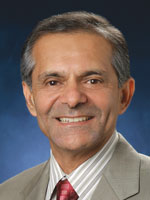
ACR President Sharad Lakhanpal, MBBS, MD, is a Dallas-area rheumatologist and Clinical Professor of Internal Medicine at UT Southwestern Medical Center and an investigator at Metroplex Clinical Research Center in Dallas, where he has participated in hundreds of clinical trials. Dr. Lakhanpal recently shared his thoughts about the Annual Meeting. Answers have been edited for space and clarity.
What makes the Annual Meeting Special or Different from other rheumatology-related meetings?
This is the largest rheumatology gathering of the year. The who’s who of rheumatology in the world will be there. The networking is incredible if you need to connect with people.
The quality and depth of the science presented are unparalleled. Any kind of important research or advance that has happened in basic science, translational science, or clinical science will be presented.
There will be doctors, basic scientists, researchers, health professionals including physical therapists, nurse practitioners, physician assistants, occupational therapists, psychologists, pharmacologists—you name them and they’ll be there. We will also have our friends from industry. The opportunity to meet people and collaborate and learn from each other is incredible. It is the interdisciplinary approach. Anybody can go to any session. The Annual Meeting is the perfect forum to exchange ideas and learn from each other.
What excites you most about this year’s meeting?
There will be so many exciting sessions. Perhaps, one thing that stands out is Saturday’s Opening Lecture by Dr. Anthony Fauci, Director of the National Institute of Allergy and Infectious Diseases (NIAID) at the National Institutes of Health (NIH). Dr. Fauci is a well-respected, well-regarded scientist/clinician globally. He is brilliant and people know his work. His talk will grab everybody’s attention. He will address emerging and re-emerging infectious diseases, a major public health concern that rheumatologists worldwide must be aware of in terms of the potential impact on their patients. Dr. Fauci will explore global public health efforts to control and contain infectious diseases and what physicians can do in their own communities. Dr. Fauci is not only the leader in the field, he is an engaging and inspiring speaker. I encourage everyone to attend the Opening Lecture.
How would you convince somebody to attend the annual Meeting?
This question takes me to my first ACR meeting—which was not called ACR in those days; it was called ARA—back in 1984 in Minneapolis, Minn. I was a fellow-in-training and fortunate to have a paper accepted. When you’re a fellow, you are reading the textbooks and papers by all these great and inspiring rheumatologists. To see them speaking about their work and then being able to walk up to them and talk to them—it was most inspiring.
The giants of rheumatology are ready and eager to engage and mentor the younger rheumatologists. That is huge and can only be experienced by attending the meeting. One realizes how collegial the global rheumatology community is.
No matter what your field of interest or expertise is, the Annual Meeting offers something unique and cutting edge for you. You will not have time to attend all the sessions that interest you, but the good news is that the ACR provides all attendees with access to the recorded talks so you can catch up at your convenience after the meeting.
Do not get overwhelmed by the size of the meeting or the number of attendees. Plan ahead, even if it is the night before, and you will have a great experience. There is also a meeting app that attendees can use to navigate the meeting.
How important are the networking events?
Networking is very important, both for professional development and personal growth. One can read the important research in the journals, or listen to the lectures online, but the networking part of the meeting only happens when you go there.
Human beings by nature are social. We all like to meet people, get together, and talk. So many collaborations, so many ideas come from just talking to people and getting to know them. One could be thinking of a particular project and then run into an expert at the Annual Meeting and talk to them. It is also about catching up with old friends and colleagues from around the world.
We have attendees from more than 100 countries. The Annual Meeting is like the mini-United Nations of the rheumatology world. I think it is critical for the advancement of science and knowledge because discussion is what leads to new ideas and new research. One may have a difficult case and not sure what to do, how to proceed. Some expert on that disease is going to be there. You can go up to them and talk and get advice.
